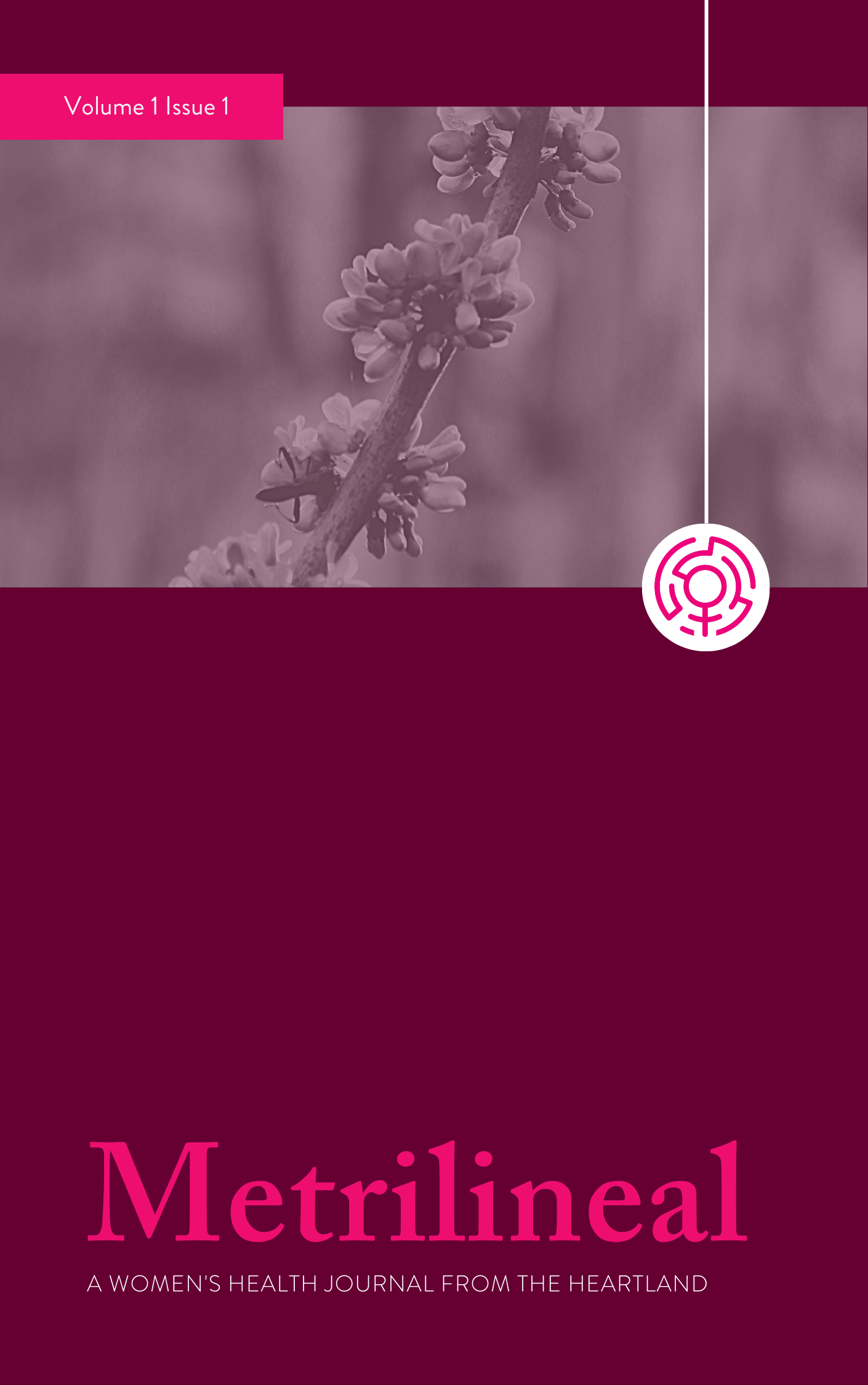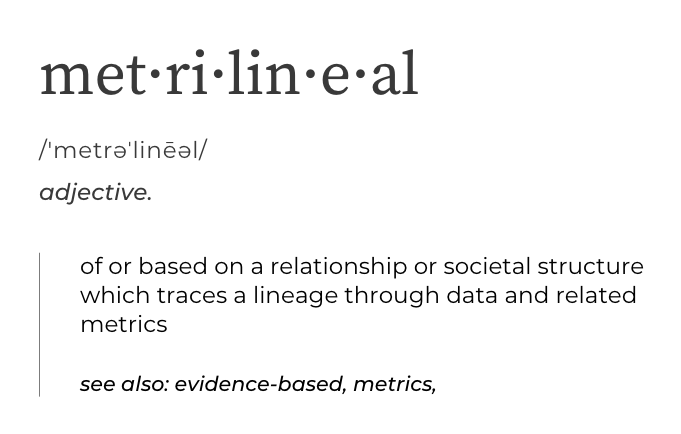Metrilineal
Metrilineal
A WOMEN'S HEALTH JOURNAL
FROM THE HEARTLAND
Metrilineal is an independent, peer-reviewed journal from Metriarch.
Through a broader range of mediums and voices than your typical journal, it is a forum for broadening and deepening conversations about a multi-faceted, often misunderstood, and overly-politicized topic—women’s health.
Latest issue

The inaugural issue of Metrilineal is finalized and being published digitally over the course of the next couple months. A full PDF will be available soon.
Check back for new pieces as they go live, or sign up for Fierce Facts to receive updates on new articles and more, straight to your inbox every Monday.
Featured content
Because we know overall health and well-being is driven by so much more than just physical health, Metrilineal welcomes submissions on topics that touch the social drivers that impact outcomes. Those include but are not limited to:
- Barriers to care
- Carceral system
- Economic mobility and stability
- Interpersonal violence
- Maternal and infant health
- Mental health
- Public participation / civic engagement
- Reproductive health
- Underserved communities
- Youth health
- Barriers to care
- Carceral system
- Economic mobility and stability
- Interpersonal violence
- Maternal and infant health
- Mental health
- Public participation / civic engagement
- Reproductive health
- Underserved communities
- Youth health
Submit your work
Unpacking women’s health issues in Oklahoma is often more complicated than it needs to be. Our submission process is not.
- Determine your submission type
- Submit an abstract
- Receive an acceptance, revision request, or rejection within one week
- Submit a manuscript
- Receive comments from peer reviewers within one month
- Review, revise, and resubmit for publication
Submission types
What’s an issue brief?
An issue brief provides a summary of the best available information about a problem or concern with policy implications. It is intended to be a basic way to share the “who, what, where, and why” of an issue, while leaving lots of room for articulating the “I don’t know” that always exists when wrapping minds around a problem.
Issue briefs are most appropriate when no policy solutions are known to exist in the local environment, and the issue is still in the problem-identification stage of public and policymakers’ awareness.
Generally, issue briefs accomplish one or more of the following goals:
- Share out basic info with others to get the word out about a problem/concern
- Explore starting points or possible pathways forward
- Bring others in to the conversation
- Look for resources to tackle a problem
Metriarch focuses on publishing pieces that align with our organization’s mission – broadening conversations around women’s health in Oklahoma. Be sure to check out the briefs Metriarch curates as part of our Data Lookbook before submitting yours to avoid duplicating efforts.
Submission requirements
- Recommended length: 1,000-3,000 words
- Recommended format –
- Title
- Description of the Problem or Concern
- Research/Data Overview
- Key Takeaways & Policy Implications
- Sources (cited according to the Chicago Manual of Style)
- Supporting imagery is not required but encouraged
- Include full name, job title/professional affiliation, and contact information
What’s a media review?
A media review recaps and contextualizes a recent movie, TV show, book, article, musical number, podcast, or any other form of media.
Metriarch focuses on publishing pieces that align with our organization’s mission – broadening conversations around women’s health in Oklahoma.
Submission requirements
- Recommended length – 750- 1000 words
- All sources cited according to the Chicago Manual of Style
- Supporting imagery is not required but encouraged
- Include full name, job title/professional affiliation, 1-2 sentence bio, and photo (optional)
What’s an op-ed?
An op-ed, or opinion essay, should have a clear point of view or argument supported by specific evidence. It’s okay and can even be powerful to get a little personal.
Generally, op-eds accomplish one or more of the following goals:
- Help people more deeply understand a topic in the news.
- Help them understand what it means for them.
- Equip them with arguments they can employ when talking about the subject.
- Elevate ideas that help them think about the world differently.
- Expose them to topics they might not have heard about.
- Help them better articulate their own perspective.
- Help them understand perspectives different from their own.
Metriarch focuses on publishing pieces that align with our organization’s mission – broadening conversations around women’s health in Oklahoma.
Submission requirements
- Recommended length – 750-1,000 words
- All sources cited according to the Chicago Manual of Style
- Supporting imagery is not required but encouraged
- Include full name, job title/professional affiliation, 1-2 sentence bio, and photo (optional)
What’s original research?
For this journal, original research involves conducting a study or analysis that contributes new insights to our understanding of women’s health. Your research questions should focus on employing systematic methodologies to gather, analyze, and interpret data. The research could address existing literature gaps, provide new empirical evidence, or introduce innovative approaches to pressing health issues.
Original research is an appropriate submission type when you’ve gathered original data (qualitative, quantitative, or mixed) and your findings offer new knowledge, implications for practice, or policy recommendations.
Generally, original research accomplishes one or more of the following goals:
- Contributes new findings to the field of women’s health
- Provides a deeper understanding of health trends, disparities, or outcomes
- Offers new insights that can inform policy, advocacy, or practice
- Contributes new analysis of existing health datasets
Advances conversations on socio-political drivers of health
Metriarch focuses on publishing research that advances the organization’s mission of broadening conversations around women’s health in Oklahoma, especially if it is relevant to local communities and policymakers.
Submission requirements
- Recommended length – 3,000-7,500 words (depending on the depth and scope of the study)
- Recommended format:
- Title
- Abstract (150-250 words)
- Introduction (include research question(s), problem statement, and a brief note on theoretical orientation)
- Methodology
- Results
- Discussion (implications for practice, policy, and future research)
- Conclusion
- References
- Appendices (if applicable, such as surveys or data sets)
- All sources cited according to the Chicago Manual of Style
- Include full name, job title/professional affiliation, 1-2 sentence bio, and photo (optional)
What’s a policy brief?
A policy brief generally builds on an issue brief by providing a summary of evidence-based best practices or policy options to address an identified problem, often with a preferred recommendation.
Metriarch focuses on publishing pieces that align with our organization’s mission – broadening conversations around women’s health in Oklahoma.
Submission requirements
- Recommended length: 2,500-5,000 words
- Recommended format (head to Quorum for more detail on each section) –
- Title
- Executive summary
- Description of the problem that policymakers should address
- Research overview
- Current & proposed policies
- Policy recommendations
- Sources (cited according to the Chicago Manual of Style)
- Supporting imagery is not required but encouraged
- Include full name, job title/professional affiliation, 1-2 sentence bio, and photo (optional)
Policies, procedures, and agreements
Editorial team
..... definition needs adjustment



